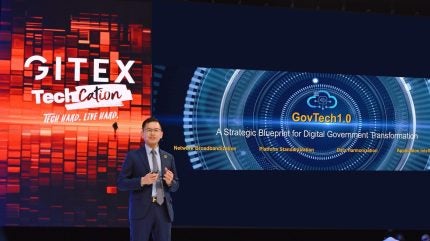
The digital transformation of government has become a central focus for nations seeking to enhance public services, improve efficiency, and remain competitive in an increasingly interconnected world. As technology continues to reshape the way societies function, governments are recognising the need to adopt comprehensive digital strategies as part of their broader national development agendas. These strategies are designed not only to modernise administrative processes but also to foster innovation, strengthen data governance, and better meet the evolving needs of citizens.
Many countries are now striving to position themselves at the forefront of intelligent governance, and there has been a marked acceleration in the formulation and implementation of digital policies across the globe.
Huawei reveals GovTech1.0 Framework
Against this backdrop, Huawei unveiled its GovTech1.0 Framework at the GITEX GLOBAL 2025 in Dubai. Presented by Allen Tang, President of the company’s Middle East & Central Asia ICT Marketing & Solution Sales Department, Huawei’s keynote outlined the company’s vision for digital and intelligent government, introducing the GovTech1.0 Framework as a strategic guide for public sector modernisation.
Tang also presented the Global Digitalization & Intelligence Index (GDII), developed in partnership with IDC and GSMA Intelligence, which benchmarks the digital progress of 90 countries across a range of indicators, including data infrastructure and policy. The index is intended to help governments make more informed decisions as they navigate the complexities of digital transformation. This is particularly important as AI continues to be deployed in all areas, transforming economic patterns and social governance models.
More than 170 countries and regions worldwide have now adopted digital strategies as part of their national development plans. The UN’s E-Government Development Index indicates that many governments in the Middle East and Central Asia are rapidly advancing their digitalisation efforts. Notably, Saudi Arabia, the UAE, and Kazakhstan have made significant progress in service efficiency and data governance through ongoing digital reforms, establishing themselves as regional leaders in developing intelligent government frameworks.
What is the GovTech1.0 Framework?
The GovTech1.0 Framework is built upon deep insights into the development patterns of digital and intelligent governments, as well as thorough research on transformation practices in the Middle East and Central Asia. GovTech1.0 also builds on Huawei’s strengths within the connectivity, cloud, and computing sectors, integrating smart networks, unified platforms and advanced AI to power digital portals, governance, public services and emergency response.
The framework itself is built on four main pillars:
Network broadbandisation: Tang stressed that high-bandwidth, multi-service private networks are the bedrock of any digital government, supporting everything from digital offices to secure, integrated e-government services.
Platform standardisation: The focus here is on unified, secure cloud infrastructure. Tang highlighted the need for dynamic resource allocation, robust security, and simplified operations and maintenance, all of which are essential for efficient, scalable government platforms.
Data harmonisation: Tang addressed the perennial challenges of data silos, inconsistent quality and security risks. The solution is a unified data integration platform that not only streamlines data flow but also enhances data governance quality and unlocks the true value of government data.
Application intelligentisation: Tang acknowledged the hurdles of long development cycles and limited AI integration in government apps. Huawei’s answer is a suite of one-stop development tools, including DevCloud and ModelArts, designed to accelerate the creation and deployment of intelligent, AI-powered applications.
The next era of governance
Digital transformation is gradually influencing the future of governance, with many countries adopting new strategies to improve efficiency and public service delivery. Huawei’s GovTech1.0 Framework is designed to support them as they address these challenges, offering practical tools to help navigate the evolving digital landscape with greater confidence and effectiveness and offers a structured approach for governments seeking to modernise.
By harnessing advanced technology, strategic insight, and a collaborative approach, Huawei empowers governments to turn complexity into opportunity, paving the way for a more connected and intelligent future.
For more information, please visit: https://e.huawei.com/ae/events/ae/gitex/2025

